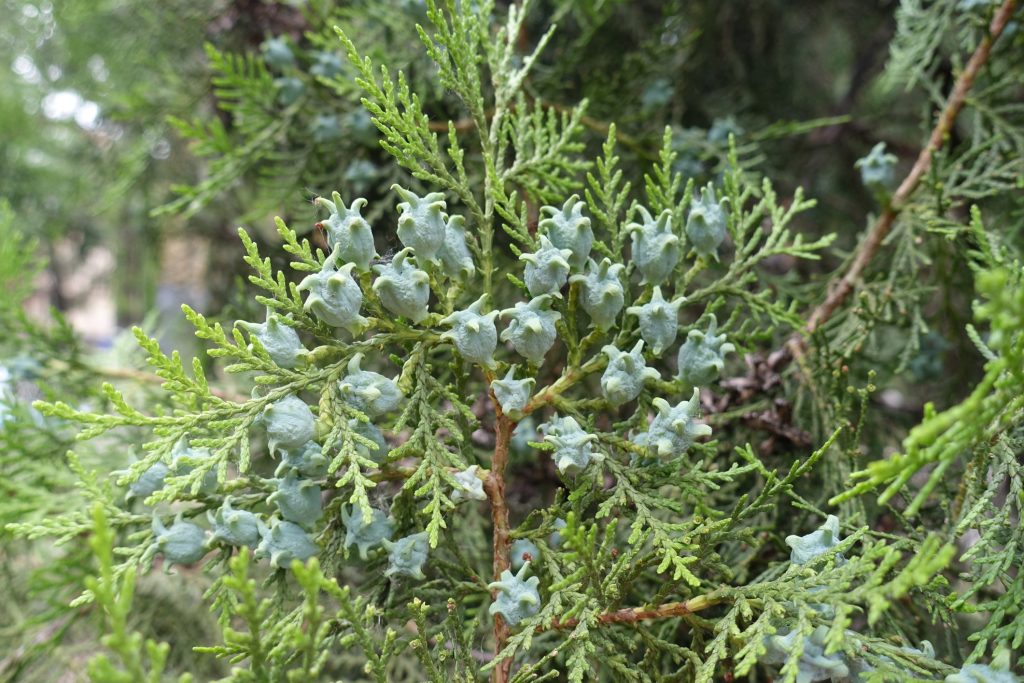Biota Seeds

What are Biota Seeds?
Biota Seeds (bai zi ren, 柏子仁), also called Liquidambaris Fructus, comes from the plant Chinese Arborvitae, which is also known as Platycladus orientalis. The term “Arborvitae” is derived from Latin, which means ‘Tree of Life’. This is in relation to its association with long life and vitality in the Buddhist school of thought. Its wood is also used in Buddhist temples for both construction work and as incense for burning during ceremonies.
Chinese Arborvitae is a tree species that is native to China and can grow up to a height of about 45 feet. These trees can be found in moist, well-drained soils throughout East Asia, and its young branches can be used to make natural yellow dye.
In Traditional Chinese Medicine, Biota Seeds fall under the category of ‘Herbs that nourish the Heart and calm the Spirit’. Such herbs can tranquillise the mind and treat symptoms such as restlessness, palpitations, anxiety or insomnia. These herbs usually have sedative properties as they can tonify Heart yin and blood.
Neutral in nature, Biota Seeds do not affect the yin-yang balance in your body. Sweet in taste, the herb can slow down acute reactions and detoxify the body. Biota Seeds also have a tonic effect on the body by replenishing qi and blood. In particular, the herb targets the Heart, the Kidneys and the large intestines.
Functions and Benefits of Biota Seeds
Traditional Chinese Medicine (TCM) shows that Biota Seeds have the following health benefits.
Biota Seeds can tonify the Heart and induce tranquilization, which help to address syndromes caused by unsteadiness of the Heart-mind. The herb is commonly indicated for symptoms such as palpitation, fearful throbbing of the heart, restlessness, stress, insomnia, dizziness, and amnesia due to Heart Yin-Blood Deficiency.
Also, Biota Seeds can moisten intestines to relax bowels and relieve constipation caused by intestinal dryness. As Biota Seeds can astringe sweating caused by Yin Deficiency, they can also address night sweats caused by Yin Deficiency.
Modern studies have discovered that Biota Seeds contain two phytochemicals – flavonoids and saponins. They can trigger changes to neurotransmitters in our brain to improve our mood by increasing our serotonin levels. Hence, it is a great herb to improve your mental health.
Biota Seeds can also promote a healthy sleep cycle by reducing insomnia, disturbed sleep, nightmares and combating jet lag. The saponins found in Biota Seeds can calm brain activity while triggering sleepiness. Biota Seeds can promote cognitive functions while working to prevent memory loss too.

How to Use Biota Seeds
The recommended daily dosage of Biota Seeds is 6 – 18g, when used as a decoction. Do note that Biota Seeds need to be crushed before decocting to release its active ingredients.
Biota Seeds and its supplements may be found in herbal stores and Asian specialty markets. This herb is usually available in forms such as pills and powder too.
Cautions and Side Effects of Biota Seeds
Biota Seeds should not be used by individuals experiencing diarrhoea or profuse phlegm. Individuals with Lung qi that is floating upwards or Stomach Deficiency with an urge to vomit should avoid using this herb too.
Do note that Biota Seeds should not be used in conjunction with Chrysanthemum Flower (Ju Hua).
Summary
Here is a summary for Biota Seeds:
- Herb name (Chinese): 柏子仁
- Herb name (Pin Yin): bái zǐ rén
- Herb name (English): Chinese Arborvitae Kernel
- Herb name (Botanical): Semen Platycladi
- Origin of species: Platycladus orientalis (L.) Franco
- Part(s) of herb used: Kernel
- Geo-specific habitat(s): Shandong, Henan, Hebei, Shaanxi, Hubei, Gansu, Yunnan
- Taste(s) & Properties: Sweet; Neutral; Administrates the Heart, Kidney and Large Intestine Meridians
- Actions: Calms the minds and Improves quality of sleep for those suffering from insomnia; Eases conditions related to constipation
References
Nobuyoshi, N., Wang, Y. L., & Hiroshi, S. (1992). Effects of biota (Bai-Zi-Ren), a traditional Chinese medicine, on learning performances in mice. 生薬学雑誌= The Japanese journal of pharmacognosy, 46(1), p62-70. [Accessed on 6th May 2023]
Yao, L., Zhang, Y., Wei, B., Zhang, W., & Jin, Z. (2018). A topic modeling approach for traditional Chinese medicine prescriptions. IEEE Transactions on Knowledge and Data Engineering, 30(6), 1007-1021. [Accessed on 6th May 2023]
Share this article on
